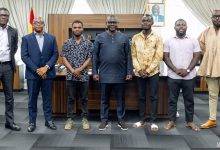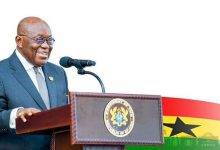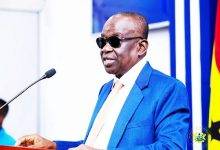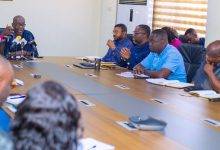
We cannot locate in the history books when Ghana and Nigeria had engaged in a conventional warfare.
But, we can authoritatively report that the war that had ensued between Ghana and Nigeria was squared off in the kitchen, where Ghana defeated Nigeriato win the bragging rights over who prepares Jollof Rice best, even though Nigerians know how to cook Jollof rice well as well.
Some say Nigeria and Ghana are one family; with one father, one mother!
When it comes to the game of football, it has been a fierce battle between the two West Africa neigbours, with a difference of one AFCON title separating them: Ghana Black Stars being four times African Champions(1963,’65,’78,’82) and Nigeria three-time winners (1980, ’94, 2013).
The pairing of Nigeria Super Eagles against the Black Stars of Ghana in a two-legged match for one of the slots for Qatar FIFA World Cup 2022, has rekindled the rivalry between the two ‘Jollof Rice brothers’.
No doubt, Nigeria has a very strong football squad for any competition at any time, whereas Ghana is struggling to raise a winnable team for the all-important match on March 25 and 29 in Ghana and Nigeria respectively.
On paper, it looks like Nigeria are streets ahead of Ghana to qualify for Qatar ’22 and indeed, they are winning the bragging rights for now. But certainly, the historical records show that on head-to-head, Ghana has a superior winning record over Nigeria.
A football match between Ghana and Nigeria is one of a friendly match, though highly competitive and the stakes very high.
That notwithstanding, and in my opinion, a win for Nigeria or for Ghana at the two-legged World Cup play-off for Qatar ‘22 is a win for either brother.
Fact is, both Black Stars and the Super Eagles deserve to be in the global competition to exhibit their soccer prowess and show why the sub-region is a power house in the game of football.
However, football, especially the qualification to the World Cup has become a lottery; it was sheer coincidence that two sub-regional neighbours have been paired to square off for one of them to be in Qatar, later in the year.
Nigeria is reported to have requested for 10,000 tickets for the grand match that was to have taken place in a stadium that has capacity for only 15,000.
Was it necessary, or is it necessary for Nigeria to request for 10,000 tickets for their fans in the midst of the deadly COVID-19 global pandemic that keeps on mutating to a deadlier strain?
Nigeria’s population in Ghana can fill any of our stadia, so they do not need 10,000 tickets to send spectators to Ghana to cheer them up.
Let us dig into the records to see how both countries are ‘one people with common destiny’ in the game of football.
First, we re-produce an article written by the Super Eagles’ Legend, SegunOdagbeme, popularly known as Mathematical Odagbeme, who temporary silenced Ghanaian soccer fans in the Accra Sports Stadium with his early goal against Ghana at the AFCON ’78. The stunner was, however, levelled up for the Black Stars, by substitute Willie Klutse in the 75th minute, with classic goal that went through the legs(sulia) of Nigeria’s goalie Emmanuel Okala, to set the stadium agog.
Odagbeme in his articles, published on Saturday, August 11, 2007 says:
“As a result of the harsh economic conditions in Ghana in the late 1960s and early 1970s, hundreds of Ghanaian footballers flooded the Nigerian league. The best of them were in every big club in the country from Mighty Jets of Jos, to Stationary Stores of Lagos, to Shooting Stars of Ibadan and even up to Sharks Football Club of Port Harcourt.
“It was very easy to distinguish them at that time because of the flair and flamboyance they brought to the game. Most of them were showmen. Unlike the typical Nigerian football player that played only with speed and power, the Ghanaians played the short passing game, with plenty of exhibitionism, and a certain air that verged on ‘arrogance.’
“Their influence was greatest in clubs like Stationary Stores and Shooting Stars at the time, both of which had a large number of these Ghanaian players in their squads. Their football became markedly entertaining, stylish and attractive to watch.
“Within a few years, this impacted very much on Nigerian football generally. The mix of the Ghanaian style of football with the indigenous Nigerian style evolved into a new generation of players with power, speed, individual skills and style.
“That‘s why and how Nigerian football caught up with and even overtook Ghanaian football – as a result of the fusion of these two different football characteristics. Ghana‘s football resembled that of Brazil, whilst Nigerian football was grounded in the typical kick-and-rush style of the English.
“Many Ghanaian players became so integrated into the Nigerian environment that many of them ended up playing for Nigeria without the authorities being able to (or chose to disregard) separate their nationalities.
“That’s how Willie Andrews, Yakubu Mambo, Baba Mohammed, Johnny Orlando, Phillip Boamah, Raymond Quakopone, Sani Mohammed, LeotisBoateng, Mohammed Lawal, AdokweiLaryea and so on, came to play in Nigeria and for the national team, the Green Eagles.
“There were many others in clubs across the length and breadth of Nigeria, playing and raising the standard of the domestic game: Joe Appiah, Edward Ansah, Joseph Carr, Arthur Moses, John Benson, HusseiniAlabi (a Nigerian, but born and raised in Ghana), and so on.”
To add to that,BawahAbdulaahi who played for the Golden Eaglets at the under 17 FIFA World Cup held in Canada in 1987 is a Ghanaian.
Former Super Eagles’ goalkeeper, Peter Rufai, who was between the sticks to kick out Ghana in the 1984 Summer Olympic Games qualifier at the Accra Sports Stadium in October 1983, grew up in Wato, a suburb of Accra, played football in Accra before relocating home. So was Siasia Samson, another Super Eagles legend, who also grew up in Accra.
It was also reported that the late Super Eagles’ striker and former Africa Footballer of the Year 1993, Rashid Yekini’s father is a Ghanaian.
Conversely, ShituMuda,Amusa Gbadamosi, 1978 African Footballer of the Year Golden Boy Abdul Razak, who played in Ghana, are said to trace their ancestral home to Nigeria.
Tell anybody, that the two-legged World Cup qualifier between the Black Stars and Super Eagles of Nigeria, who were taunted as ‘Group Champions’ in the immediate past AFCON in Cameroon – for winning a 100 percent record in the group stage, only to be humbled and kicked out of the competition by Tunisia in the last-16, is not a do-or-die affair.
It is a game for either brother!
BY SALIFU ABDUL-RAHAMAN







